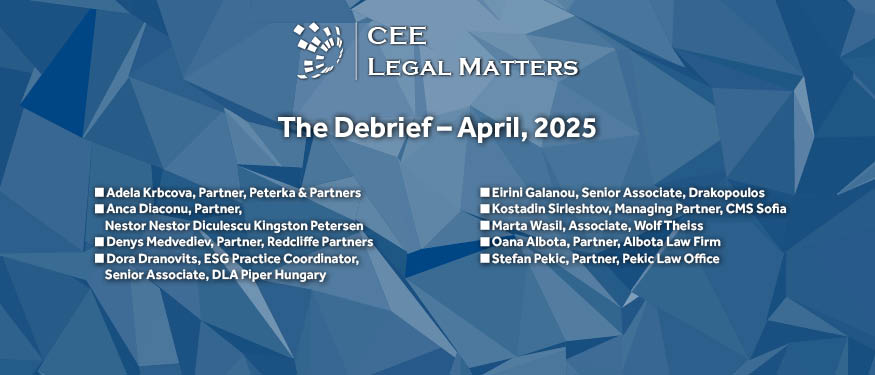Wolf Theiss has advised Visma on its acquisition of Finmatics. Brandl Talos advised the sellers.
Cerha Hempel and Wolf Theiss Advise on VIG's EUR 300 Million Tier 2 Issuance and Tender Offer for Existing Subordinated Capital
Cerha Hempel has advised Vienna Insurance Group on a two-fold capital restructuring transaction. Wolf Theiss and Linklaters advised the banking syndicate including BNP Paribas, Erste Group, HSBC, ING, and UniCredit.
CMS Advises Frauscher on Investor Shareholding Structure in Sensonic
CMS has advised Frauscher on the shareholding structure in Sensonic following Kaynes Technology's acquisition of 54% of Sensonic shares. Wolf Theiss reportedly advised Sensonic's minority shareholder, Sintela.
Wolf Theiss Advises Wabtec on USD 960 Million Acquisition of Dellner Couplers
Wolf Theiss, working with Jones Day, has advised Westinghouse Air Brake Technologies Corporation on its acquisition of Sweden-based Dellner Couplers for USD 960 million from EQT. Milbank and Vinge reportedly advised EQT.
Wolf Theiss Advises Thoma Bravo on Investment in PCMI
Wolf Theiss, working with Kirkland & Ellis, has advised Thoma Bravo on its acquisition of PCMI. Goodwin Procter reportedly advised PCMI.
Wolf Theiss Advises Kingswood Capital Management on Investment in Infotree Global Solutions
Wolf Theiss, working with Goodwin Procter, has advised Kingswood Capital Management on its investment in Infotree Global Solutions. Foley & Lardner reportedly advised Infotree Global Solutions.
The Art of the Rare Earth Deal: Is the Devil in the Details?
Mineral rights deals may seem like a big win, but they are not without risk. Considering the wider implications of mineral rights deals.
E+H and Wolf Theiss Advise on Megatech's Restructuring and Sale to Sapa
E+H has advised Megatech Industries on its reorganization from financial distress and subsequent sale to Italian mobility supplier Sapa. Wolf Theiss, working with Gianni & Origoni, advised Sapa.
Wolf Theiss Advises Uniper on Photovoltaic Projects in Hungary
Wolf Theiss has advised Uniper on the implementation of photovoltaic projects in Hungary that will jointly deliver 151 megawatt-peak of renewable energy.
Hungary’s Consumer Protection Priorities for 2025
2024 brought with it several important changes to Hungarian consumer protection regulations, most notably the changes to mandatory warranty rights. The Hungarian Consumer Protection Authority (“HCPA“) is also devoting significant effort into enforcing these rights in 2025.
An Outlook on 2025: Labor in Poland
Wolf Theiss Counsel Agnieszka Nowak-Blaszczak and Associate Oliwia Pecht talk about labor in 2025 in Poland.
Navigating the New Recording and Custody System for LLC Shares
In 2022, the Parliament of Ukraine passed legislation introducing an alternative method for recording and holding shares in limited liability companies (LLCs) and additional liability companies (ALCs). This development allows LLC and ALC shareholders (participants) to transfer recording of their shares from the State Register of Legal Entities, Private Entrepreneurs and Civic Associations (“State Register“) to the PJSC “National Depository of Ukraine” acting as the Central Securities Depository (“CSD“). This shift promises enhanced transparency, security and efficiency in share ownership, marking a new chapter for businesses and investors alike.
CMS, Miskovic & Miskovic, BDK Advokati, Mamic, Peric, Reberski, Rimac, and Wolf Theiss Advise on Podravka's Acquisition of Companies from Fortenova Group
CMS' Croatian affiliate Bardek, Lisac, Musec, Skoko, and Partners has advised Privredna Banka Zagreb as the leading mandated arranger, coordinator, and agent on a EUR 283 million club loan, which also included Erste & Steiermaerkische Bank, Zagrebacka Banka, and OTP Banka, for Podravka's acquisition of companies from the Fortenova Group. Podravka also received a EUR 50 million equity investment from the EBRD, following the acquisition. Miskovic & Miskovic, BDK Advokati, and Gugic, Kovacic & Krivic advised Podravka. Mamic, Peric, Reberski, Rimac advised Fortenova Group. Wolf Theiss advised the EBRD. DLA Piper reportedly advised Podravka as well.
RTPR and Wolf Theiss Advise on Integral Capital Group's Investment in Embryos
RTPR has advised the Integral Capital Group private equity fund on the acquisition of a majority stake in Embryos from the three founders of the business. Wolf Theiss advised the sellers.
Brandl Talos Advises Highland Europe on Investment in SmaXtec
Brandl Talos has advised Highland Europe on its investment in SmaXtec as part of a round led by KKR. Dechert's Munich-based office advised the shareholders of SmaXtec. Gibson Dunn and Wolf Theiss reportedly advised KKR.
Wolf Theiss Advises Constellation Capital on Acquisition of EVS Group
Wolf Theiss, working with Arqis, has advised Constellation Capital on its acquisition of Exportverpackung Sehnde Group, including the Polish entity Export Pack Polska.
Wolf Theiss Advises McWin on Partnership with ElephantSkin
Wolf Theiss, working alongside Goodwin Procter, has advised McWin Capital Partners on its partnership with Austrian scale-up ElephantSkin.
The Debrief: April, 2025
In The Debrief, our Practice Leaders across CEE share updates on recent and upcoming legislation, consider the impact of recent court decisions, showcase landmark projects, and keep our readers apprised of the latest developments impacting their respective practice areas.



















